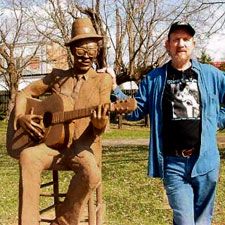Lightnin' Hopkins: Difference between revisions
imported>David E. Volk mNo edit summary |
imported>David E. Volk mNo edit summary |
||
| Line 1: | Line 1: | ||
{{subpages}} | {{subpages}} | ||
[[Image:Rex Bell at Lightnin' Hopkins statue.jpg|right|thumb|350px| | [[Image:Rex Bell at Lightnin' Hopkins statue.jpg|right|thumb|350px|<small>Rex Bell at the Lightnin' Hopkins statue dedication.</small>]] | ||
'''Sam (Lighnin') Hopkins''' (1902-1982) was a country blues guitar player, born in Centerville, Texas on March 15, 1902. Lightnin' made records for nearly 20 different record companies, and his music reached the mainstream white audience after he started working with producer [[Sam Chambers]] in the 1950's. He became more popular during the folk-blues revival of the 1960's when he switched to acoustic guitar. On the twentieth anniversary of his death, a statue of Lightnin', by artist Jim Jeffries, was dedicated on Crockett's Camp Street where he played for tips at local businesses as a child. Hopkins played at [[Carnegie Hall]], with [[Rex Bell]] on bass guitar, along with other acts including [[Pete Seger]] and [[Joan Baez]]. He also toured with the [[American Folk Blues Festival]] and played a command performance for [[Queen Elizabeth]]. His nickname derives from playing with pianist Wilson (Thunder) Smith, which led to the group nickname "Thunder and Lightning". | '''Sam (Lighnin') Hopkins''' (1902-1982) was a country blues guitar player, born in Centerville, Texas on March 15, 1902. Lightnin' made records for nearly 20 different record companies, and his music reached the mainstream white audience after he started working with producer [[Sam Chambers]] in the 1950's. He became more popular during the folk-blues revival of the 1960's when he switched to acoustic guitar. On the twentieth anniversary of his death, a statue of Lightnin', by artist Jim Jeffries, was dedicated on Crockett's Camp Street where he played for tips at local businesses as a child. Hopkins played at [[Carnegie Hall]], with [[Rex Bell]] on bass guitar, along with other acts including [[Pete Seger]] and [[Joan Baez]]. He also toured with the [[American Folk Blues Festival]] and played a command performance for [[Queen Elizabeth]]. His nickname derives from playing with pianist Wilson (Thunder) Smith, which led to the group nickname "Thunder and Lightning". | ||
Revision as of 10:11, 14 May 2008
Sam (Lighnin') Hopkins (1902-1982) was a country blues guitar player, born in Centerville, Texas on March 15, 1902. Lightnin' made records for nearly 20 different record companies, and his music reached the mainstream white audience after he started working with producer Sam Chambers in the 1950's. He became more popular during the folk-blues revival of the 1960's when he switched to acoustic guitar. On the twentieth anniversary of his death, a statue of Lightnin', by artist Jim Jeffries, was dedicated on Crockett's Camp Street where he played for tips at local businesses as a child. Hopkins played at Carnegie Hall, with Rex Bell on bass guitar, along with other acts including Pete Seger and Joan Baez. He also toured with the American Folk Blues Festival and played a command performance for Queen Elizabeth. His nickname derives from playing with pianist Wilson (Thunder) Smith, which led to the group nickname "Thunder and Lightning".
